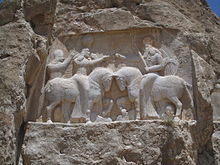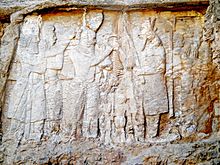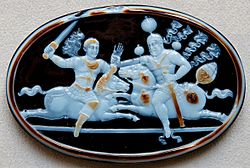|
Grand Fromage posted:Roman/Greek medicine wasn't surpassed in most respects until the 1800s. Some things like anatomy were known better later, but just as far as being treated and not dying, you weren't going to do any better until the modern era. I live in Asia and listen to Chinese medicine bullshit constantly to this day, so I can't imagine it was terribly effective back then either (though of course, much of real medicine is derived from plants and whatnot so traditional medicine isn't entirely nonsense). I know nothing of Persian or Indian. This shuffles me toward the question of what the difference between your local priest and your local doctor would have been. Broadly speaking, was their really any difference in the Roman world between the two? I mean what really made you a qualified physician?
|
|
|
|

|
| # ? May 11, 2024 21:49 |
|
Paulywallywalrus posted:This shuffles me toward the question of what the difference between your local priest and your local doctor would have been. Broadly speaking, was their really any difference in the Roman world between the two? I mean what really made you a qualified physician? Roman doctors were quite experienced surgeons, and certainly weren't just mumbling spells and casting signs. Most of them were Greek slaves and had trained in learning hospitals such as Tiber Island, but the best would have served in the legions at some point. http://en.wikipedia.org/wiki/Medical_community_of_ancient_Rome edit: Haha, loving Cato cracks me up: "The medical art in early Rome was the responsibility of the pater familias, or patriarch. The last known public advocate of this point of view were the railings of Marcus Cato against Greek physicians and his insistence on passing on home remedies to his son."  GET YOR GOVERNMENT HANDS OFF MY HEALTHCARE, I KNOW WHAT'S BEST FOR MY GET YOR GOVERNMENT HANDS OFF MY HEALTHCARE, I KNOW WHAT'S BEST FOR MY 
Kaal fucked around with this message at 06:05 on Sep 11, 2013 |
|
|
|
Wasn't there an admittedly simplified post a loooong rear end while ago and maybe on the forums, that the Indians invented therapy, the Romans surgery, the chinese medicine, and the greeks diagnosis and so on? e: it's not wholly true of course and super loving paraphrased but I mean different civilizations taking different viewpoints had different treatments.
|
|
|
|
The simplest way to think of ancient medicine would probably be it was as good as you could get before germ theory and antibiotics. Those two things kind of just leapfrog everything. Its kind of why if you could dodge the childhood mortality bullet you could feasibly live 60+ as long as you werent a miner. But even then, picking heirs is still a tricky thing because you get sick, you basically have to tough it out with no vaccines, antibiotics, etc. Your chances are better if you are rich because you can take a break and sleep it off for a week, if youre a laborer in the suburbs less so. Edit: and cancer is a big old WELP, if people even figured out it was cancer in the first place you had before you died. Berke Negri fucked around with this message at 07:09 on Sep 11, 2013 |
|
|
|
Kaal posted:Roman doctors were quite experienced surgeons, and certainly weren't just mumbling spells and casting signs. Most of them were Greek slaves and had trained in learning hospitals such as Tiber Island, but the best would have served in the legions at some point. I think he would have been one of those people who think vaccines cause autism.
|
|
|
Kaal posted:Roman doctors were quite experienced surgeons, and certainly weren't just mumbling spells and casting signs. Most of them were Greek slaves and had trained in learning hospitals such as Tiber Island, but the best would have served in the legions at some point. Let it never be said that the depths of Cato's curmudgeonliness have any bottom. I learn something new to me that is bizarre or just dickish about the guy every time I read about him. Jazerus fucked around with this message at 07:33 on Sep 11, 2013 |
|
|
|
|
Berke Negri posted:The simplest way to think of ancient medicine would probably be it was as good as you could get before germ theory and antibiotics. Those two things kind of just leapfrog everything. This is the point I always like to make. They certainly understood some portions of medicine, but without knowing about germs, or a scientific tradition to actually figure out which of your treatments are good ones, you're not going to get overly far I wouldn't think. Which is certainly not to say that they didn't figure out some good treatments for certain things, because they did.
|
|
|
|
PittTheElder posted:This is the point I always like to make. They certainly understood some portions of medicine, but without knowing about germs, or a scientific tradition to actually figure out which of your treatments are good ones, you're not going to get overly far I wouldn't think. Which is certainly not to say that they didn't figure out some good treatments for certain things, because they did. If you didn't read it yet, check out Thukydides description of the plague that hit Athens. Good stuff.
|
|
|
|
There's a lot of evidence they were setting bones and pulling teeth, like, thousands of years ago. Sure, they had to deal with draining pus from just about every wound but so did everyone prior to the 1920's pretty much.
|
|
|
|
When it comes to germs basically everything was voodoo until germ theory/antibiotics, though there is evidence that they understood a bit through experimentation and observation. There is some primitive germ theory in Greece that never catches on, and people observed that heat/alcohol seem to do something to make wounds less likely to infect, so that's known. The major Roman innovations and extremely refined technology, for the most part, broadly falls into anything that you could consider battlefield medicine or derived from that. Surgery and the treatment of violent wounds. If you got stabbed, there was nowhere in the world you'd rather be than with a Roman army surgeon until well into the 1800s.
|
|
|
|
Grand Fromage posted:The major Roman innovations and extremely refined technology, for the most part, broadly falls into anything that you could consider battlefield medicine or derived from that. Surgery and the treatment of violent wounds. If you got stabbed, there was nowhere in the world you'd rather be than with a Roman army surgeon until well into the 1800s. Any idea how much of that was really Roman development? Weren't the best doctors in Rome generally Greek?
|
|
|
|
LimburgLimbo posted:Any idea how much of that was really Roman development? Weren't the best doctors in Rome generally Greek? Yeah, but they were part of the empire. I'm not really breaking it down by ethnicity. Doctors tended to be Greeks and/or slaves.
|
|
|
|
LimburgLimbo posted:Any idea how much of that was really Roman development? Weren't the best doctors in Rome generally Greek? The majority of doctors were Romanized Greeks, but that doesn't make it any less of a Roman development. The Greeks were Roman the same way that Californians are American.
|
|
|
|
Grand Fromage posted:Yeah, but they were part of the empire. I'm not really breaking it down by ethnicity. Doctors tended to be Greeks and/or slaves. True, once they're part of the empire I suppose it's a moot distinction. Kaal posted:The Greeks were Roman the same way that Californians are American. ...no comment.
|
|
|
|
Sassanid Effortpost 1: Origins and Basic Overview Disclaimer: I'm a history student and enthusiast but by no means an expert, and most of what I know has been cobbled together over a few months. If anything I say sounds wrong, please challenge it. So, for a bit of context, at the time the Sassanids begin to emerge on the scene, Iran was being ruled by the Parthian Arsacid Dynasty. The Parthians, while they spoke an Iranian language, were considered semi-barbaric and foreign by the Persians - think of it kind of like how the Greeks considered the Macedonians. Furthermore, the Parthians were increasingly unsuccessful against the Roman Empire to the West - Carrhae-type battles were a rarity as the Roman military of the area had developed stronger cavalry in response, and were far more effective. (Coincidentally, this period of Parthian military decline overlapped with the "Five Good Emperors" of Rome, so they had some very bad luck being placed against some of the most competent rulers of their rival Empire). Regardless of their circumstances, repeated military defeats and invasions weakened the prestige and standing of the Parthian Emperors. There's an Iranian concept called Farrah that is functionally like the Chinese "Mandate of Heaven" - the fortune of the realm being tied to the worthiness of the ruler; the Parthian military defeats - particularly when it resulted in the Romans raiding Mesopotamia and sacking Ctesiphon eroded their Farrah in the eyes of their citizens. Unlike the Achaemenids or Sassanids, the Arsacids were closer to a feudal state, with dynastic aristocrats wielding far more power than governors/Satraps appointed by the Emperor - the noble Parthian families may have been more trusted by the early kings than any Persian noble, but as time passed and the Parthian houses were able to establish their own semi-autonomous power blocs, this arrangement became less efficient for the state as a whole, and further alienated the support of Persians in the richer western regions of the Empire. Finally, Dynastic strife took root - even though the Parthian Emperor was in theory succeeded by his eldest son, in practice an ambitious other relative could marshal support among the nobility and usurp the throne - or an unwilling son could have it usurped for him by ambitious nobles. This combination of weakness both internally and externally led to the rise of the Sassanids - Vologases VI was opposed by his brother Artabanus V, and though Artabanus took most of the Empire, Vologases controlled critical areas in Mesopotamia. (Things were further complicated by our friend Caracalla, who took advantage of the opportunity to raid the Parthian Empire)  Topographic map of Iran and surrounding areas The importance of Mesopotamia to a Persian Empire cannot be understated - it's consistently been the richest and most economically powerful region in Pre-Islamic Persian Empires, and though control of it didn't automatically translate to control of the Empire, it's comparable to Egypt or Africa (As in modern Tunisia) for the Roman Empire. Though Iran-proper isn't just mountains-and-desert, agriculture in that area is far more intensive and communications/travel is more difficult in the interior, mostly confined to a few particular roads/passes. Mesopotamia on the other hand is very flat, comparatively far more fertile/rich/populous and easier for a single person to keep under their personal control.  Ardashir's Coronation So - the main sources we have for the fall of the Parthians and rise of the Sassanids were written by people sympathetic to the Sassanids, who were not averse to doctoring history for the purposes of propaganda (more on that later), but there's not much doubt about the basics of their rise to power. The name of their Dynasty comes from the first male member to reach a high position - Sasan (similar to the Achaemenids coming from Achaemenes and the Arsacids from Arsaces). Sasan was a notable priest in Persis (modern Fars) - the region of Iran that the Persians originally settled in (Think of it kind of like post-Roman Europe, where France was settled by the Franks, England by the Angles, etc.), where Persepolis and Pasargadae once stood. His son Babak and grandson Ardashir consolidated control first in the important city of Istakhr, and then over Persis as a whole, unopposed by the divided and weak central government. Ardashir eventually gained the notice of the Parthian king Artabanus in 224 AD when he began expanding into other provinces of the Empire, and after several battles, Ardashir defeated Artabanus' army and Artabanus died during the battle. Ardashir later commemorated this victory in a rock-carved relief at Naqsh-e Rostam, and his official historians claim that he killed Artabanus in single combat. He named himself Shahanshah (Emperor/King of Kings) and swiftly disposed of Vologases to bring all of Mesopotamia and western Iran under his rule by 226. The Parthian Empire was pretty much dead at this point, and though the fiefdoms of Parthian nobles still commanded large portions of eastern Iran, they weren't able to resist his conquests. In fact, seven Parthian clans allied with and subordinated themselves to Ardashir, though only two of them - Karen and Suren - are particularly notable. Ardashir immediately promoted two trends that the Parthians had not - centralization of government and religious orthodoxy. Though the Parthian Clans still retained hereditary authority in the East, most of the empire was governed by a sophisticated bureaucracy, with noble ministers appointed by the Emperor or his officials, and control of the army and land was firmly in the hands of the Emperor. Land, and the right to collect taxes on that land, was rented out to the minor nobility that served as administrators, but it was considered the Emperor's property, not the nobles' and could be rescinded at any time. In addition to providing a portion of their collected taxes to the Imperial government, these small landowning nobles were obliged to serve as the cavalry of Persia in times of war - they were in many ways similar to knights, but within a different political system. Succession laws were codified under Ardashir with some elements of Divine Right - claiming that Ahura Mazda had chosen the Sassanid Dynasty to rule - whereby the Emperor designated his heir from among his children, and if he died before designating a heir, a council of military and religious leaders selected a candidate from amongst the Sassanid Dynasty.  Ardashir receiving the right to rule from Ahura Mazda Religion was incredibly important to the Sassanid Empire, just as important as Christianity for the later Roman Empire and deserves its own effortpost, but for the purposes of the Sassanid origins - the Zoroastrian religion was fragmented during Parthian times, with local cults and/or heresies sprouting across the Empire, and a good deal of polytheist mixing - there were still some people that even worshiped a combined Zeus-Ahura Mazda divinity as a leftover from the time the Macedonians ruled Iran. A number of religious leaders supported the Sassanids in the early stages of their rebellion simply because they felt the Parthians had allowed Zoroastrianism, along with its moral and social order to decay, and that Iran required a virtuous man to restore both Iran and Zoroastrianism. The approval of the Zoroastrian clergy legitimized the Sassanid usurpation in its critical early years through this appeal to Zoroastrian virtue opposing the foreign and decayed state of the Parthians. The Sassanid Dynasty were originally priests themselves, and sought to make an 'Orthodox' Zoroastrianism that was based on the variant of Zoroastrianism common in Persis - and in fact contradicted some earlier Zoroastrian teachings in the Avesta. This was in part to repay the clergy that had legitimized their rebellion, and partly as a scheme to culturally unify the Empire. Though there was opposition from priests whose local traditions were deemed unfitting to the Sassanid version of Zoroastrianism, the Sassanids had military might to back their decrees, and succeeded in codifying a 'canon' and secure hierarchy for it. Furthermore, Ardashir oversaw further social stratification - some of which had already existed previously, but not in a formal sense. Society was divided into classes that may have well been castes, with social mobility being extremely limited, though there were exceptions. At the top, the Sassanid Dynasty was a caste of its own, followed by Priests, Warriors, Scribes and Commoners (Peasants+Artisans), with Merchants in the lowest caste. Each caste except the Merchant had a Fire Temple and religious festival specifically for it, and touted as essential components of a healthy society, so long as they remained in their assigned roles. It was possible, but very rare, for an individual to move from one class to another. Merchants were seen as parasites on society according to Zoroastrian teachings; people who took the labour of others and made a profit on it, instead of doing 'honest work', and so were considered lesser by the authorities despite their powerful economic role. The end goal of these changes in the political, religious and social spheres was to promote stability, order and conformity in response to the comparatively decentralized and unorganized time of the Sassanids, and to try and ensure no social upheavals such as the one that had led to Sassanids' own rise. After this period of consolidation both politically and socially, Ardashir led the Sassanid state to its first war with Rome in 230, based around Rome's support of Armenia, which was ruled by a branch of the Arsacids. The war was inconclusive, with no territory gained by either side, and both sides breaking off hostilities to deal with other threats. The Roman Emperor, Alexander Severus had to fight invading Germanics, while Ardashir had unspecified troubles in the East. In 235, Alexander Severus was murdered by his own troops, kicking off the Third Century Crisis, and only 2 years later Ardashir and his son and heir Shapur launched another offensive, conquering the important border-cities of Nisbis and Hatra. Ardashir died in 242, succeeded by Shapur, whose achievements would lead to him being known as 'Shapur the Great' for his military victories. Shapur continued the war, even taking Antioch for a time. Though it was still relatively inconclusive, and he was forced out of Antioch and Nisbis, political instability at Rome forced the current Emperor (Philip the Arab) to pay a massive indemnity of 500,000 gold Denarii and acknowledge Armenia as part of the Sassanid sphere of influence.  Shapur capturing Valerian In 250, Shapur declared war on Rome again, citing broken treaties, and won the greatest Persian victories over Rome since Carrhae, shattering two Roman armies, looting many of the Roman cities of Syria and Anatolia and capturing hundreds of thousands of Romans as slaves, including the Roman Emperor Valerian. He was eventually pushed out of Roman territory, but the damage the Persians had inflicted upon Roman territory was incomparable at the time - no foreign enemy had caused so much damage to the Empire for centuries. After more than a century of gradual decline compared to Rome, Ardashir and Shapur had re-established Persia as a state that Rome was forced to treat as an equal (a distinction they'd never offered to the Parthian Empire) - a centralized, economically powerful, military effective and culturally potent state able to match and challenge Rome in a way no state since Carthage had. -- I'm gonna try to do one of these a day, trying to keep them roughly chronological, with the occasional topical-focused one like Sassanid Religion, Military or Society. Hope you guys enjoy!
|
|
|
|
Very interesting, thanks! Something I've noticed and want to ask about, why does everyone everywhere in ancient times hate merchants so much? It seems universal, at the least from Rome to China, it's here in under the Sassinads; were there any notable exceptions? Is it because they can build power outside the traditional land based system?
|
|
|
|
Rockopolis posted:Very interesting, thanks! I know there were a few major ancient civilizations that prized merchants - in particular, the Islamic world and the various civilizations of Mesoamerica. I would say your guess is pretty accurate, with them (and commercialism) posing a potential threat to the power of traditional agrarian nobility, but I'm not sure what made it different in the cases where merchants weren't discriminated against.
|
|
|
|
Yes, their ability to circumvent "proper" channels of wealth, and thus power, accumulation are the most important factor in the general dislike for merchants throughout ancient and medieval society. There was a rudimentary understanding of the basic mechanics of a market economy, including that ownership of the means of production and movement of goods allow for the accumulation of wealth in excess of the labor put in. If it's land, fine - that's finite, controllable purely by force of arms, and traditionally owned by a noble class. It was easy enough to tamp down on powerful individuals for the people at the top, in the absence of widespread discontent or other external factors that make rebellion easier. Production and trade, on the other hand, have no such easily-regulated limits with the technology and social structures of the time. This is part of why regulations that could be effectively laid down were often quite strict. Some societies were more comfortable with exploiting market economics than others. The Muslims were initially conquering rulers and so valued the traditional rights of the aristocracy in conquered regions very little at times. Commerce, on the other hand, is of course quite profitable if you do it right, and if you don't value traditional landowner rights (or, of course, worker rights - but that's endemic in all of history) very much there's no reason not to accept it. It helps that Muhammad was a merchant, too. If you want to see the process that these rulers feared in slow, steady action, I recommend reading about Early Modern Japan or pre-revolution France, where even low caste status (for Japan) and periodic loan negation for nobility (for France in particular) could not prevent merchants and financiers from accruing quite a lot of power. Jazerus fucked around with this message at 19:38 on Sep 11, 2013 |
|
|
|
|
Another important aspect was the more visceral element that merchants do not seem productive. With landowners/farmers there's a clear product, food. Likewise for artisans or craftsmen or even servants there's an obvious result and labour element that obviously contributes to society. Even the scum who sweep the streets obviously do something that benefits everyone. What merchants contribute is basically economical, they facilitate the movement of goods and effectively help to keep everyone else functioning but all that's obvious is that they're buying a product off one person for price X and selling it to this other person for X+1. If a merchant buys a bushel of corn off a farmer for 1 gold piece and sells it in town for 2, what have they added in terms of value to the the wheat? Nothing yet they're making money off that. If they're making enough to have more money than the farmer it's easy to see how that comes off not just as parasitical but unjust as the farmer putting the work in is actually doing worse than he could without the merchant (if you take the value of the wheat to be 2 gold pieces). It's easy to say that merchants do actually provide a valuable service in terms of allocating resources to where they are needed and allowing a greater degree of specialisation (so town A that has good pastureland can produce mostly cattle and Town B with fertile soil can produce crops and neither needs to suffer shortages due to trade) but this isn't how trade was understood back then, by and large. Add to this the capacity trade gave for moving outside social norms and power structures (we still haven't figured out how to actually control economic systems) and it's easy to villify merchants for producing nothings and simultaneously exploiting producers and posing a potential threat to established power figures.
|
|
|
|
A heads up to anyone in the thread, if this Persian stuff interests you, you should read the Shahnama (or Shahnameh). It's an Islamic era collection of pre-Islamic oral traditions relating to Persia. Sort of a Plutarch meets the Odyssey sort of thing, but you get to read, for instance, a mostly accurate description of Ardashir's rise to power followed by his cunning defeat of the Worm of Haftvad. Plus, Persian take on Iskander. (aka, Alexander.)
|
|
|
|
Earlier in the thread someone mentioned a battle in which a large force of cataphracts managed to charge blindly into a trap pit, leading to a catastrophic defeat. I recently came across something that reminded me about it, but I haven't been able to find the name of the battle by searching Google or skimming back over the thread. Could someone who knows please remind me of the name of the battle?
|
|
|
|
cafel posted:Earlier in the thread someone mentioned a battle in which a large force of cataphracts managed to charge blindly into a trap pit, leading to a catastrophic defeat. I recently came across something that reminded me about it, but I haven't been able to find the name of the battle by searching Google or skimming back over the thread. Could someone who knows please remind me of the name of the battle? It was one of the many, many Battles of Herat. This particular Battle of Herat happened in 484.
|
|
|
|
What was the status of peoples in conquered lands who weren't enslaved? Was there something in between 'Slave' and 'Freedman', or were they all given to legionnaires who retired there, essentially as serfs? Or perhaps, did plots of land get sold off back in Rome, along with the people inhabiting them? I'm thinking of specifically two examples: 1) Gaul: If I remember correctly, Caesar claimed* to have enslaved a million Gauls. Surely that didn't constitute the entire population of Gaul? And what do you even do with that many slaves? 2) Greece: It always seems there's an abundance of Greek slaves throughout the Roman Empire, especially 'Learned Greeks'. Did "Greek" refer to Greeks that had moved to Anatolia / The Levant, and so as the Empire continued expanding so did the Greek populace? * I think it's a fair assumption that approximate numbers dating back thousands of years are likely inaccurate. edit: Are there any good books on the (local) economic impact of a Roman/contemporary conquest?
|
|
|
Iseeyouseemeseeyou posted:What was the status of peoples in conquered lands who weren't enslaved? Was there something in between 'Slave' and 'Freedman', or were they all given to legionnaires who retired there, essentially as serfs? Or perhaps, did plots of land get sold off back in Rome, along with the people inhabiting them? I'm thinking of specifically two examples: You could be a noncitizen, nonslave, nonfreedman and it was no big deal, more or less equivalent to being a freedman. Recently conquered peoples might have a tough time integrating, but they weren't intrinsically worthless as people any more than any other noncitizen once the conquest was over. 1) The main thing you do with that many slaves is mine and farm. It was, indeed, not the entire population of Gaul, and native Gauls were quite Romanized within a few generations - the only way you might tell the difference would be the mustache. 2) Sure, anyone who spoke Greek and was of Greek ancestry was a Greek. The Greek colonies in Italy and Sicily were how Romans first had contact with them, after all.
|
|
|
|
|
I recall that Rome liked installing puppet kings in conquered lands, so as to maintain the illusion of local control. As long as they kept things quiet and paid their taxes to Rome, they were largely left alone. The average person's life wouldn't change that much after a Roman conquest.
|
|
|
Deteriorata posted:I recall that Rome liked installing puppet kings in conquered lands, so as to maintain the illusion of local control. As long as they kept things quiet and paid their taxes to Rome, they were largely left alone. The average person's life wouldn't change that much after a Roman conquest. This was how they conducted themselves in the urbanized east, where there was no reason to mess with a good thing. They usually preferred direct rule of "barbarian" lands by Roman governors - puppet kings there had too much of a tendency to want to be real kings.
|
|
|
|
|
Jazerus posted:You could be a noncitizen, nonslave, nonfreedman and it was no big deal, more or less equivalent to being a freedman. Recently conquered peoples might have a tough time integrating, but they weren't intrinsically worthless as people any more than any other noncitizen once the conquest was over. 1) How were slaves spread out? Were they all brought to trade centers and sold, or were the majority kept to work the land that used to be theirs? 2) I meant there seems to be a poo poo ton of Greek slaves. I'm probably just thinking every learned slave was Greek. What happened to the nobility/royalty of conquered peoples? If there was any real hereditary form of this - rather than an elected tribal leaders or officials.
|
|
|
|
the JJ posted:A heads up to anyone in the thread, if this Persian stuff interests you, you should read the Shahnama (or Shahnameh). It's an Islamic era collection of pre-Islamic oral traditions relating to Persia. Sort of a Plutarch meets the Odyssey sort of thing, but you get to read, for instance, a mostly accurate description of Ardashir's rise to power followed by his cunning defeat of the Worm of Haftvad. Plus, Persian take on Iskander. (aka, Alexander.) edit: turns out I own it already 
Koramei fucked around with this message at 19:28 on Sep 12, 2013 |
|
|
|
Iseeyouseemeseeyou posted:1) How were slaves spread out? Were they all brought to trade centers and sold, or were the majority kept to work the land that used to be theirs? There more ways than getting conquered to become a slave, and I believe there was some system that made it a pretty good deal for a doctor sort of person but maybe someone else can fill in.
|
|
|
|
Koramei posted:
How does this happen?
|
|
|
|
I heard someone claim that the ancient Greeks were all colorblind. Is there any truth to that? I'm not sure if those painted statues prove or disprove that.
|
|
|
|
SlothfulCobra posted:I heard someone claim that the ancient Greeks were all colorblind. Is there any truth to that? There's a certain truth to it, but I don't know that you can ever really prove it. It stems from the fact that Greek works often describe the ocean as being dark red, the color of blood or wine, or the rainbow having three colors: purple, green-yellow, and red. There's not a lot of reason to assume that they were all colorblind; it makes far more sense to assume that their culture just didn't really have a word for blue, or their color words carried meaning beyond simply the wavelength of light like we think of it. Perhaps describing the sea as similar to blood, or the sky as bronze, had some emotional or metaphorical connection we don't really get. Similarly, I think there are cultures out there that just don't use subjective directions (right-left-forward-back), instead using cardinal directions (north-south-east-west).
|
|
|
|
Some people have a thing called a library you philistine.
|
|
|
|
PittTheElder posted:There's a certain truth to it, but I don't know that you can ever really prove it. It stems from the fact that Greek works often describe the ocean as being dark red, the color of blood or wine, or the rainbow having three colors: purple, green-yellow, and red. Everything that is viewed is viewed through context. Since we cannot actually know what context led to the comparison of red to blue then we cant really gather anything meaningful from the question other than conjecture. To say greeks were color blind would be something of an odd thing to purpose as what is colorblindness to a culture that linguistically calls blue red? A nice example of how this could have worked linguistically would be the way the Chinese use inflection to denote one thing from another. It could be that ancient greek lost some contextual and cultural clues as to how the word, or the concepts for the word, red work. Also, I believe we are now referencing a RadioLab dealing with colors where this topic was briefly discussed. Season 10 episode 13.
|
|
|
|
SlothfulCobra posted:I heard someone claim that the ancient Greeks were all colorblind. Is there any truth to that? No, the Greeks were not colorblind. Here's a review of a book that specifically debunks that notion. However, the whole issue of cultural/linguistic differences in color perception is really very interesting. There's a great series of posts about it here on Empirical Zeal that are highly recommended reading.
|
|
|
Pimpmust posted:There more ways than getting conquered to become a slave, and I believe there was some system that made it a pretty good deal for a doctor sort of person but maybe someone else can fill in. If you were a doctor, scholar, or other service provider/craftsman, slavery might be analogous more to indentured servitude. You weren't exactly "unfree", just partially so, and slaves became freedmen all the time. So much so, in fact, that part of the reason for the transition to proto-serfdom under Diocletian was that there just weren't many slaves around anymore - conquest was a thing of the past, and manumission was such a regular and accepted process that the slave population was quickly dwindling to nothing. Entrepreneurial freedmen had a pretty good deal, too; you were still expected to be your former master's client, and so you remained part of his patronage network. He might refer people to you for business, or support you in legal cases. The ancient Greeks that were supposedly colorblind aren't the guys who made the painted statues - that theory concerns the Homerian Greeks. The stereotype about Homer (if he even existed) is that he was blind, so even if the language hypothesis isn't true, who was he to know that the sea didn't look like wine? More than that, all languages have a lot of standard metaphors that, if you dig into them, make little sense. Jazerus fucked around with this message at 20:21 on Sep 12, 2013 |
|
|
|
|
I for one would really like to know if there was a time when people accidentally threw their babies out along with the bathwater.
|
|
|
|
I've had wine that (when in quantity) is a very deep purplish color. I could see it being considered an ocean-like color under certain circumstances. I would lean more towards linguistic fuckups or dramatic license on part of the original writer before claiming some biological characteristic on part of ancient people who (in aggregate) have distant ancestors today that as a population do not seem to display abnormal rates of colorblindness. Besides, most colorblindness just causes a shitload of trouble discerning certain shades of colors when placed next to each other, not complete replacements of one primary color with another.
|
|
|
|
The Entire Universe posted:I've had wine that (when in quantity) is a very deep purplish color. I could see it being considered an ocean-like color under certain circumstances. I would lean more towards linguistic fuckups or dramatic license on part of the original writer before claiming some biological characteristic on part of ancient people who (in aggregate) have distant ancestors today that as a population do not seem to display abnormal rates of colorblindness. It is likely that they simply perceived the characteristics of colors differently than us. We define colors based on hues, but we still associate colors with other things, particularly emotions. Green with envy, seeing red, feeling blue. We think of blue as cold, red as hot. The Greeks probably made similar associations. Perhaps the common characteristic of wine and the ocean was simply wetness, or perhaps Homer was associating the obsession with the sea that some people have with being drunk. It was a different culture that perceived the world and processed it in a different way. It's fascinating to try and climb inside their heads and understand how they thought.
|
|
|
|

|
| # ? May 11, 2024 21:49 |
|
Consider, the sea at sunset?
|
|
|














 Yes, it's like a lava lamp.
Yes, it's like a lava lamp.






















